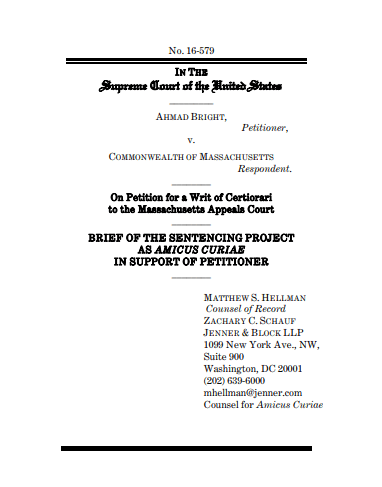
Summary of Argument
The Sentencing Project’s decades of experience in juvenile justice resoundingly confirms the central insight of Miller v. Alabama, 132 S. Ct. 2455 (2012): Children are “constitutionally different from adults for purposes of sentencing” because the defining characteristics of children—their lack of maturity, greater vulnerability to negative influences, and limited control over their environment, among others—make them “‘less deserving of the most severe punishments.’” Id. at 2464 (citation omitted). Miller properly applied this principle to hold that mandatory life-without-parole sentences for children violate the Eighth Amendment’s “requirement of individualized sentencing for defendants facing the most serious penalties.” Id. at 2460. The Sentencing Project’s decades of experience likewise teaches that the same principles apply to children, like Petitioner, who receive a mandatory life sentence, even if the sentence leaves open the possibility of parole.
The Sentencing Project’s research confirms that thousands of children nationwide receive such sentences even though they have the same hallmarks of diminished culpability that were dispositive in Miller: As the case studies presented below illustrate, many of these children were themselves first victimized by violence. They often came from broken homes in which one or both parents were absent or in prison. And they often fell in with negative peer groups, but were unable to extricate themselves given the vulnerabilities and immaturities of youth. While these children may have participated in serious crimes, many are not culpable enough to justify exposing them to a lifetime in prison. That is especially true for children, like Petitioner, who were convicted not as principals but via felony murder, joint venture, and other derivative-liability theories.
No other mechanism in the criminal-justice system avoids the constitutional injury these children suffer. The process of transfer from juvenile to adult court is often mandatory, as it was for Petitioner, and it is never sufficient to take account of children’s lesser culpability.
Likewise, the parole system is no answer for these children. The possibility of parole does nothing to change the fact that many children, in light of their “diminished culpability,” did not deserve to be exposed to life sentences in the first place. Miller, 132 S. Ct. at 2464. Parole’s practical realities, too, confirm that it is no adequate safeguard. Parole is entirely discretionary, and parole boards are executive-branch bodies whose decisions often reflect the influence of politics, not individual equities. Particularly for prisoners like Petitioner with murder convictions, these boards and their members often apply express or implied policies that “life means life”—so that juvenile offenders may spend decades in prison for reasons having nothing to do with their individual culpability